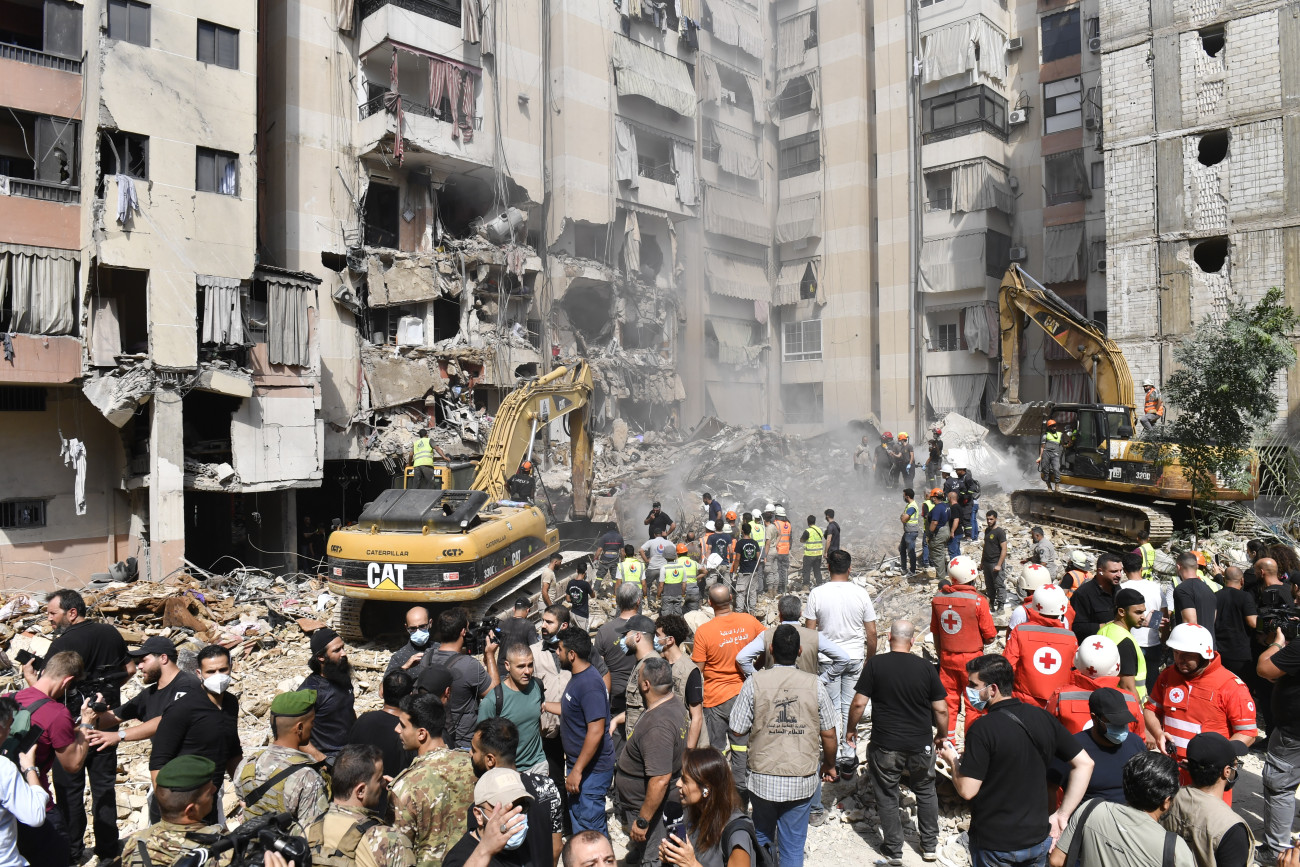

Introduction
On the heels of a series of special operations and airstrikes to degrade and decapitate Hezbollah, Israel has intensified its campaign against the Tehran-backed militant group. Israeli warplanes have struck hundreds of Hezbollah targets across Lebanon, including missile launchers, arms depots, and command-and-control centers. But as Israel’s Operation Northern Arrows moves ahead and casualties in the hundreds continue to mount, Lebanese fear what will happen to their country, while concerns grow that the conflict will escalate into an all-out regional war.
In the latest installment of the Defense Rapid Reaction series, experts from MEI’s Defense & Security Program provide their views on the likely evolution of the Israeli-Hezbollah war, the potential for the conflict to draw in outside actors, as well as the impact of the war on global terrorist recruitment.
Photo by Houssam Shbaro/Anadolu via Getty Images
Reactions
-
Joseph L. Votel
Joseph L. Votel

Retaliation leads to … retaliation
The rapid developments between Hezbollah and the Israel Defense Forces (IDF) have been astonishing to witness. The latest evolution of the conflict can be traced to July 27, when Hezbollah rockets killed 12 children and teenagers in a Druze village in the Golan Heights. Israel responded with a targeted operation in southern Beirut that killed Fuad Shukr — a founder of the group and its most significant military leader. A promised massive response from Hezbollah did not materialize beyond the now-routine rockets and missiles used to terrorize northern Israeli villages. Last week’s well-executed, large-scale sabotage operation against Hezbollah communication devices, followed by broad strikes on rocket and missile launchers and accompanied by targeted strikes against more members of the group’s leadership, has brought the inevitable conflict between Israel and Hezbollah back into clear focus.
For its part, Israel is prioritizing the objective to get its citizens from villages in the north, displaced after the Oct. 7, 2023, attacks, back into their homes. To do this, it must address the continuing threat of Hezbollah and its considerable military capabilities that can target most Israeli population centers. On top of an already long campaign in Gaza, Israel cannot afford a long-drawn-out war of attrition in the north. The IDF’s attacks carry a sense of urgency to take advantage of Hezbollah’s disarray and deal a strategic blow that forces them to back down, seek some form of agreement that allows Israeli families to return to their homes, and provide Israel some security along this border: an “escalate to de-escalate” strategy.
Hezbollah promises an “open-ended battle of reckoning” until Israel withdraws from Gaza and has followed these warnings with rocket and missile attacks against military and industrial sites in the heavily populated city of Haifa and elsewhere in northern Israel. With IDF operations essentially complete in Gaza, Hezbollah’s attrition strategy appears to be an effort to draw Israel into a prolonged conflict that will undermine its government, economy, and global standing — buying time to recover from their recent setbacks and perhaps creating an opportunity for a strategic blow of their own.
The prospects for heading off this inevitable conflict with diplomacy are low right now, and we will likely see these competing strategies play out further before we see any change.
Gen. (ret.) Joseph L. Votel is a Distinguished Senior Fellow on National Security at MEI. He retired as a four-star general in the US Army after a nearly 40-year career, during which he held a variety of commands in positions of leadership, including most recently as commander of CENTCOM from March 2016 to March 2019.
-
Sam Mundy
Sam Mundy

Time to weigh short-term gains against potential for wider escalation
War is inherently unpredictable, and Israel’s decision last week to alter the balance of power with Hezbollah in southern Lebanon poses its own uncertainties. If escalation dominance was a strategic goal to enable the return of displaced citizens to their homes in the north, Israel may be on the way to achieving it. However, the full contours of this “new phase,” as Israeli Defense Minister Yoav Gallant called it, have not yet fully materialized. Now is the time to consider whether this bold stroke has the potential for generating wider regional escalation.
Already stoked by the war in Gaza, Iranian proxies in the region might consider Israel’s attacks in Lebanon a further casus belli and ramp up their malign activities against Israel proper and US forces in Iraq, Syria, and several Gulf countries. The Institute for the Study of War recently noted that Kata’ib Hezbollah in Iraq has pledged to send fighters, arms, and equipment, joining with many other groups in the region acting against Israel. Several Iranian diplomats and politicians have also issued strong declarations of support for Hezbollah. Given their recent attacks on Israel, including a ballistic missile fired earlier this month, the ever-opportunistic Houthis in Yemen will likely use these events as a pretext to attack Israel again and wreak further havoc on commercial shipping in the Red Sea.
The guiding hand behind these groups, Iran, faces a dilemma: allow its crown jewel in the Axis of Resistance to be diminished or ignite a larger conflict that threatens the regime. Given its predilection for asymmetry, Iran will certainly continue to provide moral and physical support to its surrogates, sooner or later attempting to replenish Hezbollah missile stocks destroyed by ongoing Israeli air strikes. Tehran could also attempt to pressure the international community to intervene on Lebanon’s behalf by threatening to close the Strait of Hormuz or by harassing or attacking commercial ships transiting the region. If it has not done so already, Iran might also increase cyber-attacks against Israel or US bases and stations in the region.
Taken together, these actions portend a greater risk of miscalculation as the action-reaction-counteraction cycle unfolds. The potential for escalation is presumably why the US has decided to send further reinforcements to the region.
Sam Mundy is a retired lieutenant general in the US Marine Corps. He commanded Marine Corps Forces Special Operations Command and Marine Corps Forces Central Command, responsible for employing Marines assigned to the Middle East. He is the president of Once a Marine LLC and a Distinguished Senior Fellow at the Middle East Institute.
-
Sean Morrow
Sean Morrow
Israeli special operations and targeted strikes on leaders sow mistrust within Hezbollah and Hamas
The recent escalation of the Israeli-Hezbollah conflict has demonstrated the devastating effects of well-executed intelligence and special operations missions with follow-on conventional strikes. The psychological impacts and the information operations that come with such successes will have long-lasting effects. These events created an imminent need for global leadership and diplomacy, specifically for the combined leadership of the United States and regional Arab partners.
As states contend with the changing nature of warfare and the rise of global information operations, particularly as they emanate from major powers in the cyber domain, we should remember that sometimes what is old is new. The psychological and informational effects of ancient tactics such as infiltration, human intelligence, betrayal, and espionage still maintain powerful downstream impacts. Consider the impact of the killing of Hamas leader Ismail Haniyeh in his highly secured apartment in Tehran, the infiltration of the supply chains for Hezbollah’s communications, and the subsequent knowledge of the whereabouts of a gathering of top Radwan Force leaders leading to a decapitation strike in Beirut. Each of these attacks will create a significant rift inside Hamas and Hezbollah as both groups wonder what other resources have been compromised and, more importantly, how many of their people have been compromised. Both groups are likely experiencing a crisis of trust, internally and between organizations.
In this uncertain environment the instinct for all sides is to strike, and regional war may seem a foregone conclusion. No participant has a strong domestic political incentive to agree to a cease-fire. The US, however, still contends that war is not inevitable. A cease-fire need not betray the US’s ironclad commitment to Israel, nor the Arab states’ unity with Palestinian objectives; but an agreement toward an end to carnage, a return of hostages, and a commitment to even a temporary security will not be reached by the participants alone. Joint US-Arab leadership is required to provide an offramp and an exit strategy. The time for multilateral diplomacy is now.
Col. Sean Morrow is the Director of the Combating Terrorism Center at West Point. His views do not necessarily reflect those of the United States government or of the US Armed Forces.
-
Michael K. Nagata
Michael K. Nagata

Terrorist recruitment wins the latest Hezbollah-Israel battle
The ongoing violent clashes between Israel and Hezbollah, militarily significant though they are, have ramifications far beyond just the military, political, or ideological hostilities between these belligerents. Among them is a large and growing opportunity for expanded regional and global terrorist recruitment, incitement, and future attacks that, prior to Oct. 7, 2023, the United States and many other countries had concluded were on a permanent downward trajectory.
Regardless of how justified either actor, Israel or Hezbollah, may be in their reciprocal attacks, the perceptions cascading from Israeli assaults on an “Arab state” such as Lebanon are contributing to an already rich recruitment breeding-ground that will foster the next generation of terrorists. It matters little that Hezbollah is a proxy of Iran, for “recruitment” is mostly an appeal to the heart and its grievances, not the head.
Both Sunni and Shi’a populations, across the Middle East and around the world, are not only outraged by attacks on Muslim population centers, they are further angered by the damage they believe is being done to Lebanon, popularly regarded as the “pearl of the Middle East.” This anger is further compounded by pre-existing scars left by Israel’s invasions of Lebanon in 1978 and 1982, its occupation of the south from 1985 to 2000, and its most recent war with Hezbollah in 2006.
These current events provide terrorist recruiters a treasure trove of compelling stories (regardless of how false or misleading they may be) that can and will be used to attract an entirely new generation of violent extremists and scores of new sympathizers/enablers. And importantly, it matters little whether that recruiter operates in the Middle East, Africa, Central and South Asia, or anywhere else in the world. The advent of the internet’s myriad methods of generating compelling and attractive virtual connections will enable those recruiters to create the next global wave of jihadist terrorism.
Lt. Gen. (ret.) Michael K. Nagata is a Distinguished Senior Fellow on National Security at MEI. He retired from the US Army in 2019, after 38 years of active duty, with 34 years in US Special Operations. His final position was director of strategy for the National Counterterrorism Center from 2016 to 2019.












